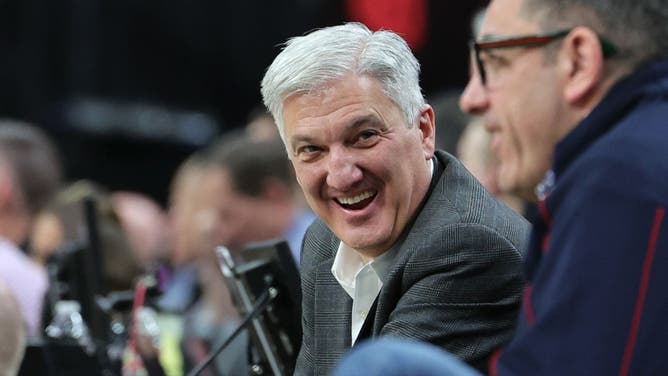PAC-12 President Would 'Declare Victory' If Television Deal Puts Them In 'Bronze Medal' Category, Arizona Could Still Look Around
We're waiting to see if the Pac-12 can strike a media deal that would suffice conference members, which is now an everyday topic. It's been reported that the conference has agreed to a Grant of Rights deal, member schools like Arizona are still waiting on the television deal to sign.
This has turned into the soap-opera that's become a talking point around college football for the past few months. As the Big Ten, SEC and Big 12 look toward the future with their own negotiated television agreements, PAC-12 members are still waiting.
Arizona president Robert Robbins was in Washington, DC on Wednesday speaking with congress members about the current state of NIL. At the same time, Robbins told media members that he was unaware of any agreement to a Grant of Rights deal, mentioning that he had not been made aware of a deal.
But, in terms of whether or not he'd be happy with a television deal that would have them behind the SEC and Big Ten, Robbins has to be happy with what he gets at the moment.
“We’re not going to get a Big Ten deal. We're not gonna get an SEC deal," Robert Robbins noted. "But if we finish third in this sweepstakes, I've never thought that winning the bronze medal was a great aspirational goal. But if we win a bronze medal, I think we'd all declare victory.”
This is a far cry from where we were at before USC and UCLA decided to jump to the Big Ten. Now, the conference is looking for some type of life-line that would keep other schools like Colorado from leaving for the Big 12.
While athletic directors and presidents are saying the right things in terms of sticking together in the Pac 12, a school like Arizona could potentially move on. When asked if Arizona would consider leaving for another conference (Big 12), Robert Robbins did not shy away from the answer.
"Depends on what our financial deal is.” Robbins told reporters.
What Does The Future Hold For PAC-12, Television Deal?
One of the biggest takeaways from the last few days is that PAC-12 members have reportedly agreed on a revenue sharing model. This is all dependent on what type of television deal the conference gets, but at least they can reportedly agree to something.
The bigger problem lies in the fact that conference members are using the term 'hopeful' a lot when it comes to a media deal. Negotiations on a new television deal have been ongoing since July, with commissioner George Kliavkoff leading the charge. While he's tried to secure a big enough deal to please conference members, we're still waiting for something to materialize.
ESPN has spent its money on the SEC, Big 12 and ACC, with smaller conferences getting space on the network. So, they're not going to shell out money at the moment, while FOX is tied in with the Big Ten in a monster deal, along with CBS and NBC. I imagine you're starting to get the picture.

Pac-12 Commissioner George Kliavkoff is currently trying to negotiate a television deal for the conference(Photo by Ethan Miller/Getty Images)
There are not enough networks willing to fork over anywhere close to Big Ten or SEC money, especially for a conference that could see other members jump ship. Sure, they can verbally agree to a Grant of Rights deal, but it means nothing without a television home. Right now, this is about holding the PAC-12 together, if this is what certain members truly want.
"My prediction is that we’re all going to stay together as a Pac-12," Arizona president Robert Robbins noted. "There’s 10 of us right now. I’m hopeful that the deal (TV) is going to be good enough to keep us together. I think that’s the best thing for our students and alumni. That’s what we’re hoping for."
While some schools are hoping for a deal that would make fiscally smart not to move, other schools like Colorado are exploring its options, which should make other PAC-12 schools a bit nervous.
Either way, we're still waiting to see what kind of television deal George Kliavkoff can produce, along with ten schools worried about its future.